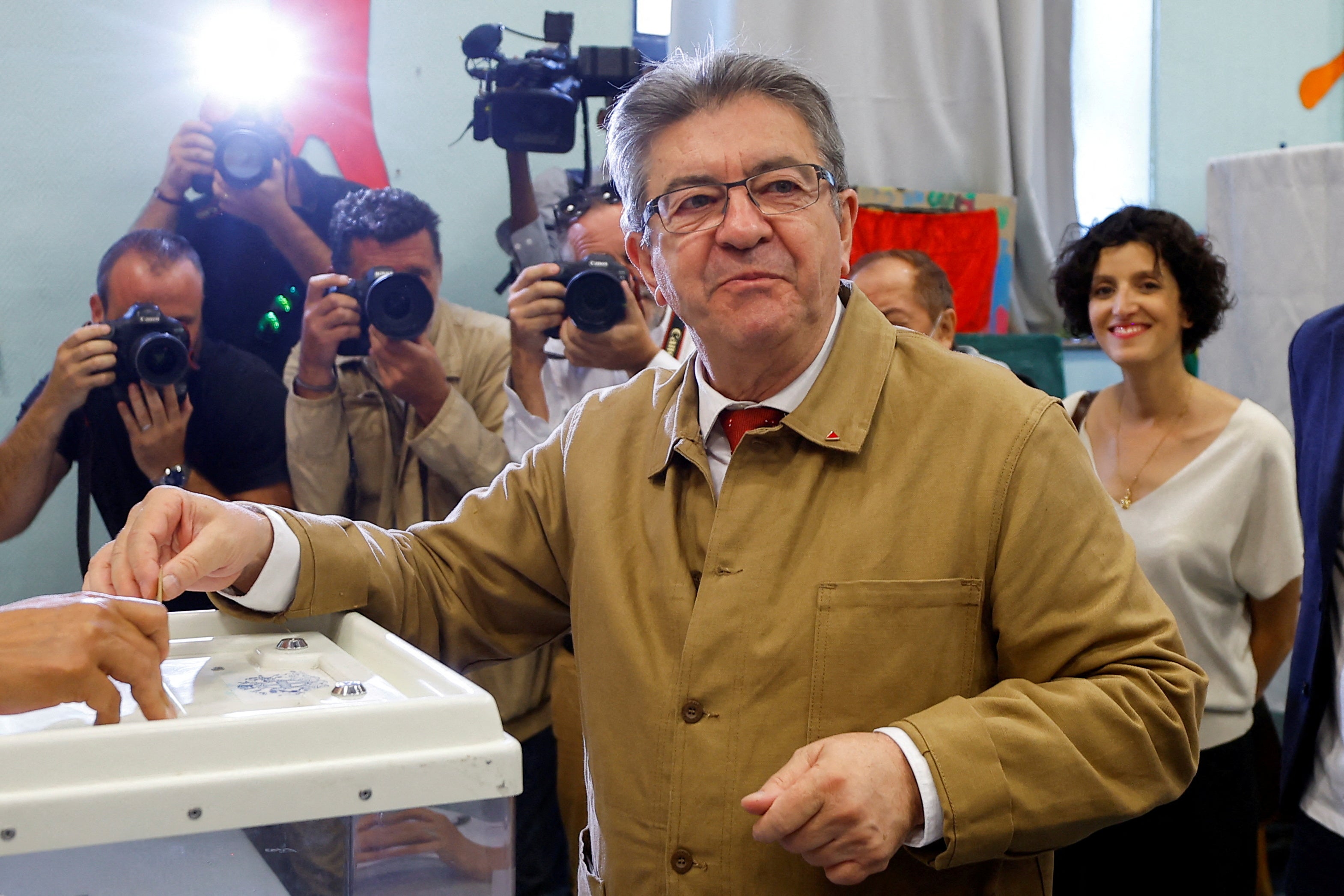Jean-Luc Melenchon: Who is the veteran French socialist and what does his new coalition stand for?
Emmanuel Macron loses parliamentary majority after Sunday’s elections as left and right make huge gains
Just two months after a resounding win in the French presidential election, Emmanuel Macron suffered a shock in the country’s parliamentary elections as his La Republique en Marche party won 245 seats but fell well short of the 289 needed for an absolute majority.
The result leaves Mr Macron presiding over a minority government, forced to come to terms with a coalition partner or argue bill-by-bill to keep his economic reform agenda afloat as France, like much of the rest of Europe, struggles to address a cost of living crisis and rising inflation.
The revolt was led by Marine Le Pen’s far-right National Rally candidates, storming back after her defeat in April to claim 89 seats in the lower house, and a recently-formed leftist coalition known as Nouvelle Union Populaire Ecologique et Sociale (abbreviated as “Nupes” and otherwise billed as United Front), which won 124 seats.
Nupes is led by fiery socialist Jean-Luc Melenchon, who could hardly contain his glee at the outcome.
“It is a totally unexpected situation, absolutely unheard of, the rout of the presidential party is total,” Mr Melenchon crowed after the results began rolling in.
“They wanted to avoid defeat at the cost of dishonour. Tonight they have both defeat and dishonour.”
The veteran left-winger and leader of La France Insoumise (France Unbowed) also ran in April’s presidential vote alongside Mr Macron and Ms Le Pen and finished third, subsequently vowing to become prime minister to “revive the system”.
Born in Tangier, Morocco, on 19 August 1951, the son of a postmaster and a primary school teacher, Mr Melenchon moved to Normandy with his family in 1962 and subsequently earned a philosophy degree from the University of Franche-Comte in Besancon before embarking on a teaching career of his own.
He abandoned that profession in September 1976 to enter left-wing politics and join the Socialist Party (PS), developing a federal newspaper dedicated to cementing a union between his side and the French Communist Party, serving as senator for Essone from 1986 to 2000 and as minister for vocational education under prime minister Lionel Jospin between 2000 and 2002.
Mr Melenchon returned to his senatorial constituency between 2004 and 2010 but, having gradually become more and more disillusioned with what he considered to be the French socialist movement’s gradual drift away from radicalism towards centrist compromise, he finally abandoned the PS in 2008 to form the Left Party and act as its co-president alongside Martine Billard.
He represented that venture as member of the European Parliament for South-West France, serving from 2009 to 2017, and, when the party duly joined the Left Front coalition, he stood as that body’s presidential candidate in 2012, finishing fourth.

Mr Melenchon’s true breakthrough came with the founding of La France Insoumise in February 2016, with whom he again ran for the presidency in 2017, winning 19.6 per cent of the vote as Mr Macron was swept to power before bettering that result this spring when the young president was re-elected, the leftist this time picking up 21.95 per cent.
His latest project unites France’s socialist, communist and green parties and sees him continue to act as a thorn in Mr Macron’s side, capitalising on widespread public discontent about the state of the economy in the aftermath of the pandemic.
Nupes offered the electorate no fewer than 650 different policies to fix France while candidly confessing that its own members did not agree on at least 33 of them.
In a nutshell, it endorses raising the minimum wage, lowering the retirement age, taxing wealthy elites, creating jobs and fixing the price of everyday essential consumer goods.
Agreement is less definite among its members about international matters, particularly concerning the EU and Nato.
Mr Macron was scornful of the collective’s policies last week, dismissing its manifesto by pointing out: “They quote the word taxation 20 times and the word ban 30 times, which gives you a pretty clear idea of the spirit of their programme.”
But the old firebrand has since left him with a great deal of thinking to do.
Join our commenting forum
Join thought-provoking conversations, follow other Independent readers and see their replies
Comments


Bookmark popover
Removed from bookmarks